What is BigCommerce in Starting an Ecommerce Business?
BigCommerce is one of the most popular ecommerce platforms on the market for ecommerce sellers. It offers a wide range of features and options for businesses of all sizes.
Some of the key features include a built-in shopping cart, order management, shipping capabilities, and much more. BigCommerce also has a large user base, so finding help and support is always easy.
There are many ecommerce platforms available on the market, but which is the best for your business? You can also check out bigcommerce alternatives or bigcommerce competitors for better options to consider for your ecommerce business.
There are many factors to consider when choosing an ecommerce platform, such as features, pricing, and merchant support. However, one of the most important considerations is how productive the platform is for your business.
One of the most popular ecommerce platforms on the market is BigCommerce. BigCommerce is a comprehensive platform that offers a wide range of features for ecommerce businesses.
These features include a built-in shopping cart system, shipping capabilities, and automated order processing.
BigCommerce offers powerful marketing tools that allow merchants to build and manage their own affiliate programs.
It is a well-rounded platform that is productive for many ecommerce businesses. It offers all the essential features required by most merchants, as well as some unique benefits that can be valuable in specific circumstances.
If you are looking for an ecommerce platform that will give your business the flexibility and power it needs to grow rapidly, then BigCommerce should be at the top of your list.
If you’re unhappy with BigCommerce’s features or options, there are a number of alternatives to bigcommerce ecommerce platforms to consider. Some of the most popular alternatives include Shopify, Volusion, and Magento. Each offers its own set of benefits and drawbacks, so it’s important to test out a few to see which is best for your business.
Start building your own ecommerce business today with one of the many great BigCommerce alternatives available!
List of Bigcommerce Alternatives
1. Shopify
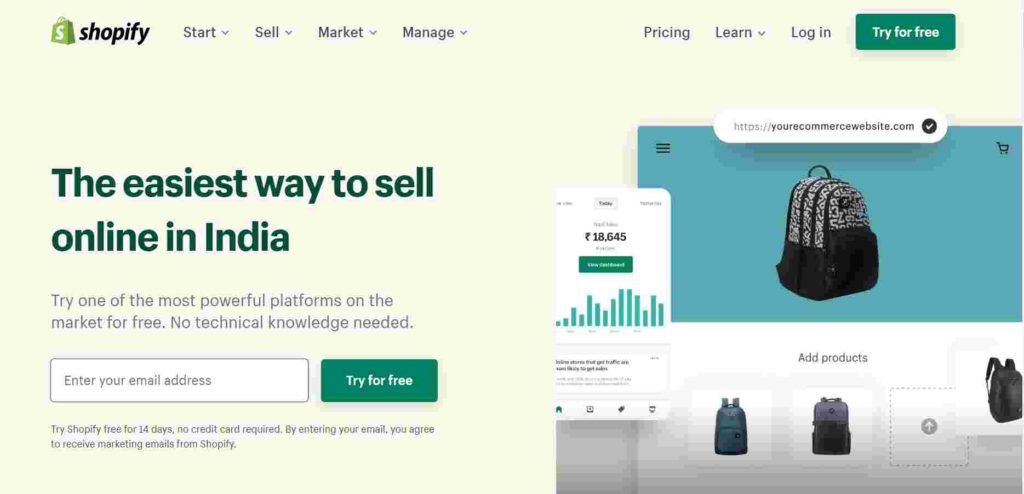
Shopify is a popular ecommerce platform that allows small and large businesses to sell physical products online. It offers a range of features and tools that can help businesses grow their online presence.
Shopify is easy to use and can be customised to meet the needs of businesses of all sizes. It also has a strong community support network, so businesses can get help with any issues they may encounter.
Shopify is an ecommerce platform that enables online sellers to create and manage their own online stores.
Shopify provides users with everything they need to build and manage their online stores, including a customizable website, shopping cart, and payment processing.
It also offers users a number of features and tools to help them run their businesses, such as marketing and shipping tools, and 24×7 support.
Shopify is a platform for ecommerce merchants that offers site-building tools, hosting, and a range of additional features.
One of the most beneficial features of Shopify for merchants is the Store Analytics tool, which provides insights into customer behavior and sales data.
This information can be used to make informed decisions about marketing, product development, and other aspects of the business. Another key feature of Shopify is fast loading speed, which is essential for providing a good user experience for customers.
Pros of Shopify
- Shopify offers a loyalty program that can help you keep track of your customers and their spending habits.
- With the campaign manager, you can create and manage campaigns to drive traffic to your store and increase sales.
- You can also create coupon codes to offer discounts to your customers.
- Shopify also offers customer service 24×7.
Cons of Shopify
- Shopify is costly for small businesses.
- There are lot of features in the tool which is not necessary for small businesses.
Read Article Best shopify alternatives in India
2. Magento
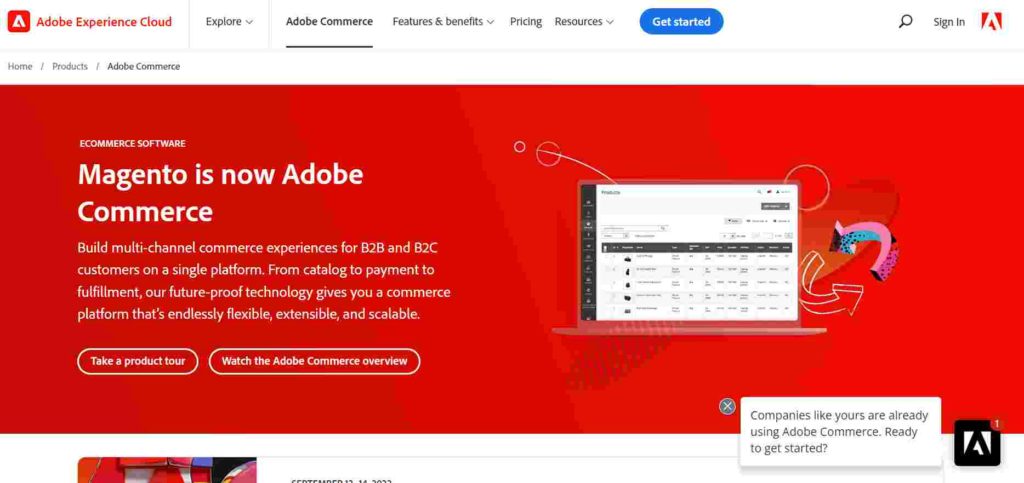
Magento ecommerce is a popular online platform for sellers due to its flexibility and scalability.
Magento ecommerce provides online merchants with the ability to control the look, content, and functionality of their online store. Magento ecommerce is also used by some of the world’s largest brands for products selling to their users.
Magento is a popular ecommerce platform that provides merchants with a comprehensive store management system. Merchants can use Magento to manage their inventory, create and manage product listings, process orders, and track shipping and fulfillment.
Magento also offers a number of powerful marketing and customer engagement features, including push notifications.
Push notifications are a handy way for merchants to keep their customers informed about new product arrivals, special sales and promotions, and other important updates.
By using Magento, merchants can streamline their operations and improve their customer engagement, resulting in increased sales and satisfaction.
Pros of Magento
- Open-source, so anyone can contribute code.
- Page Builder makes it easy to create custom pages without having to code.
- Product Recommendations helps increase sales by showing relevant products to customers.
- Store themes allow for easy customization of the look and feel of the store.
Cons of Magento
- Open-source means that there is no one company responsible for maintaining the code.
- Page Builder can be difficult to use if you’re not familiar with coding.
- Product Recommendations can sometimes show products that are not relevant to the customer.
3. WooCommerce

WooCommerce is a popular ecommerce platform that enables sellers to set up and operate their own online stores.
It is known for its ease of use and flexibility, and provides sellers with all the tools they need to create and manage their stores.
WooCommerce is a great option for sellers who want to set up and operate their own online stores, and it is also a good choice for sellers who want to have more control over their store design and functionality.
WooCommerce is a plugin for WordPress that allows users to turn their WordPress site into an eCommerce store.
WooCommerce is great for merchants because it is a very user-friendly platform with enhanced security features. Navigation is also easy to use, which makes it a great choice for those who are not familiar with using WordPress.
Pros of WooCommerce
- Open source means that the code is freely available for anyone to use and modify. This makes it a very attractive platform for developers.
- There are no licensing fees associated with using WooCommerce.
- WooCommerce is a very versatile platform. It can be used to sell physical goods, digital goods, and even services.
- WooCommerce has a large number of plugins and themes available. This makes it possible to customize the look and feel of your store.
- WooCommerce is a very popular platform. This means that there is a large community of users and developers who can offer support.
Cons of WooCommerce
- WooCommerce is not a hosted solution. This means that you will need to find your own hosting and set up the platform yourself.
- WooCommerce can be a bit complex to set up. This is especially true if you are not familiar with WordPress.
- WooCommerce is not the cheapest platform available. However, it is still very affordable.
4. Squarespace

Squarespace is a popular ecommerce store platform for online merchants. It’s easy to use and has a lot of features that make it a great choice for businesses of all sizes.
Squarespace has everything you need to create a professional online store, including a customizable checkout process, product pages, and a shopping cart.
One of the most important features Squarespace offers is the ability to accept payments through a variety of different payment gateways.
This is important because it gives businesses the flexibility to choose the payment gateway that best meets their needs. Additionally, Squarespace offers coupon codes, which can help businesses save money on their ecommerce transactions.
Pros of Squarespace
- Squarespace offers a variety of ecommerce templates that make it easy to set up and manage an online store.
- Website analytics and SEO tools are built into the platform, making it easy to track and improve your site’s performance.
Cons of Squarespace
- Squarespace can be more expensive than some other website builders.
- There is a learning curve involved in using the platform, so it may take some time to get the hang of things.
5. Sellix
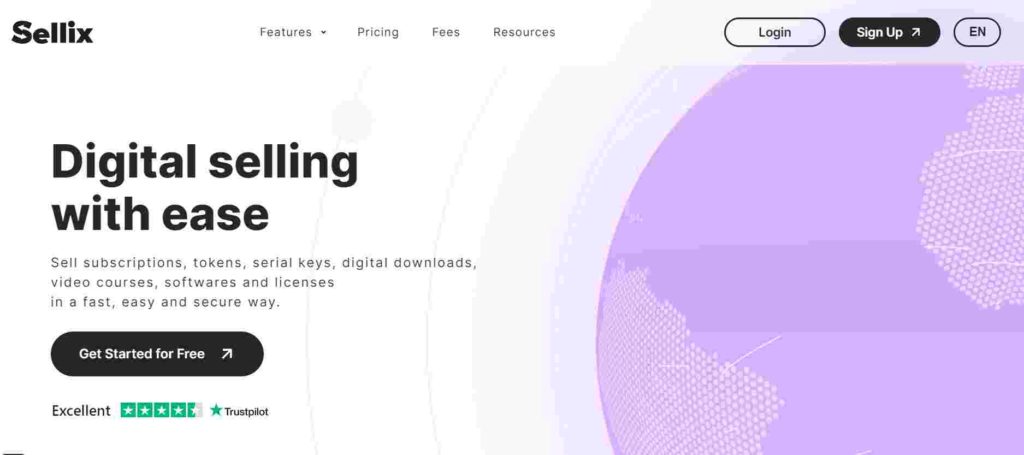
What is Sellix ecommerce store platform for ecommerce merchants?
Sellix is an ecommerce store platform that enables merchants to set up and sell their products online.
The platform provides a range of features and tools to help merchants run their businesses effectively, such as a payment gateway, product management, order management, and shipping options.
Sellix also offers a number of marketing and promotional tools to help merchants boost their sales and visibility online.
By providing shipping and delivery notifications, Sellix helps ecommerce merchants stay organized and productive. Additionally, Sellix’s smooth web interface makes it easy for merchants to manage their orders and track their inventory.
Pros of Sellix
- You can sell video courses on Sellix and reach a larger audience than you would if you sold them on your own website or through a different platform.
- Sellix features intelligent commerce, which means that it can automatically generate coupon codes for your customers and upsell them on products that they might be interested in.
- You can use coupon codes to discount your products on Sellix, which can help you attract more customers and boost your sales.
Cons of Sellix
- Sellix takes a percentage of your sales, so you will need to factor that into your pricing.
- The platform can be complex to use, and it may take some time to get the hang of it.
6. Swell
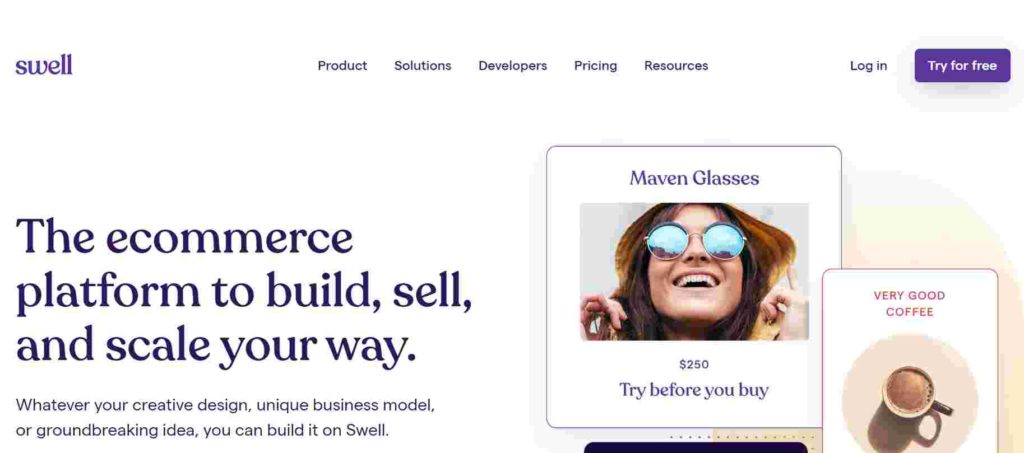
Swell is an ecommerce store marketplace that provides a platform for ecommerce merchants to sell their products.
Swell offers a variety of features to its merchants, including the ability to create a custom store, manage inventory, and process payments. Swell also offers a number of marketing and promotional tools to help merchants promote their products and drive sales.
Swell is a great tool for ecommerce merchants because it offers payment processing and data backup features. It is easy to use and merchant accounts are automatically created, so there’s no need to worry about set up or maintenance.
Swell integrates with popular ecommerce platforms like Shopify and Magento, so merchants can get started right away.
Pros of Swell
- A wide range of features and customization options.
- No need to worry about hosting or managing your own website.
- Can create a professional looking storefront quickly and easily.
Cons of Swell
- Reliant on hosting platforms and therefore subject to its rules and regulations.
- The tool fees can add up, especially if you use a lot of the features and customization options.
7. Drupal

Drupal is a powerful, open-source eCommerce platform that is flexible enough to meet the needs of small businesses and large enterprises alike.
Drupal provides the perfect foundation for building an online store, with features such as product management, shopping carts, and order management. Drupal also offers a wide range of plugins and themes to customize your store.
Drupal is a popular content management system (CMS) that helps businesses easily create and manage their websites.
It offers a variety of features that can be beneficial for ecommerce merchants, such as shipping and delivery notification, coupon codes, and product catalog management.
It can help make your ecommerce business more efficient and productive by providing these tools to streamline your workflow.
Pros of Drupal
- Open source means that the code is freely available for anyone to use and modify.
- Drupal is highly scalable, meaning it can be used for small websites as well as large, complex ones.
- Drupal offers a wide range of features out of the box, including user management, taxonomy, content moderation, and more.
- Drupal is highly customizable and can be extended with modules and themes.
Cons of Drupal
- Drupal can be a complex platform to learn and use.
- Drupal websites can be slow and resource-intensive.
- Drupal has a relatively small community compared to other open source platforms like WordPress.
8. CoreCommerce
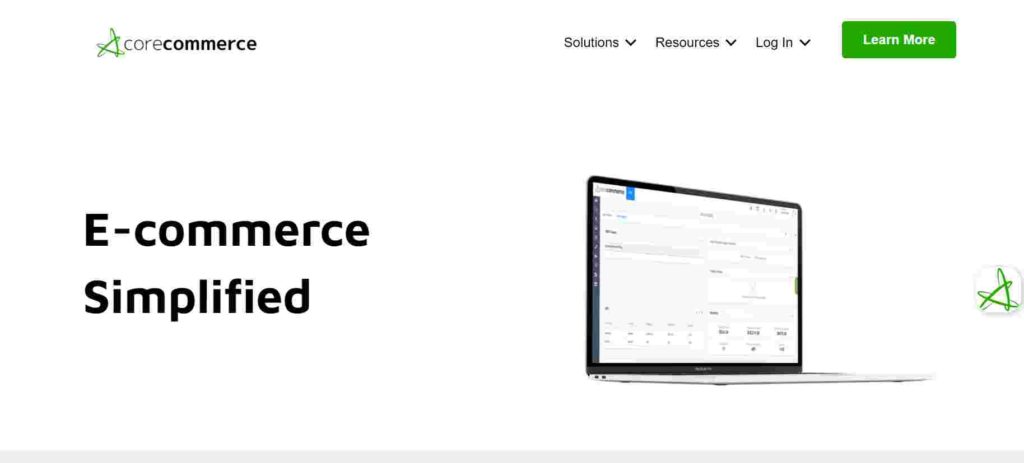
CoreCommerce is a powerful ecommerce platform that provides merchants with advanced features and tools to help them sell online.
With CoreCommerce, merchants can take advantage of features such as unlimited products and categories, a customizable checkout process, and support for multiple payment methods.
CoreCommerce also offers a range of built-in marketing tools to help merchants promote their products and drive sales.
CoreCommerce is a productive ecommerce platform for merchants because it offers features like abandoned cart recovery and campaign manager.
These features allow merchants to recover lost sales and manage their campaigns more effectively, resulting in increased sales and productivity.
Pros of CoreCommerce
- CoreCommerce is a store management system that provides users with an easy-to-use interface and navigation.
- The system also offers store analytics to help users track their store’s performance.
- CoreCommerce also supports multiple payment gateways, making it a versatile option for businesses.
Cons of CoreCommerce
- There is no free trial available for CoreCommerce.
- The system does not offer a built-in shopping cart, so users will need to integrate an external solution.
9. SAP Commerce Cloud
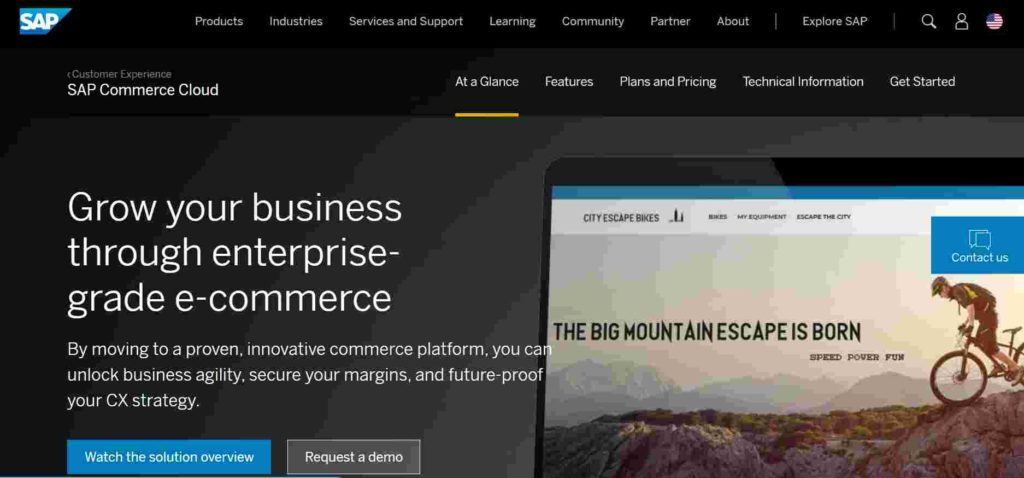
SAP Commerce Cloud is a powerful ecommerce store platform that helps merchants improve their online sales.
The platform is designed to provide fast loading speeds, making it easier for customers to find and purchase products.
SAP Commerce Cloud also offers a variety of features to help merchants manage their online store, including order management, product management, and customer management.
SAP Commerce Cloud is a productive ecommerce platform for merchants because it offers promotion opportunities and user-friendly navigation features.
For example, merchants can use SAP Commerce Cloud to target promotions to specific customer groups, and can also customize the navigation of their store to make it more user-friendly.
Pros of SAP Commerce Cloud
- SAP Commerce Cloud is a powerful eCommerce platform that provides a lot of features and benefits to users.
- The integration is built-in and easy to use, making it a great choice for businesses that want to get started with eCommerce quickly and easily.
- The platform includes features such as promotion and coupon codes, which can help businesses increase sales and attract new customers.
- The mobile app makes it easy to manage your eCommerce store on the go, and provides a convenient way for customers to shop.
Cons of SAP Commerce Cloud
- SAP Commerce Cloud can be expensive for businesses, and the monthly fees can add up quickly.
- The platform can be complex to use, and it can take some time to get used to all of the features and options.
10. Salesforce Commerce for B2C

Salesforce Commerce is a B2C ecommerce store platform for ecommerce merchants that offers a loyalty program.
The loyalty program allows merchants to keep track of customer purchases and offer rewards for customers that make frequent purchases.
Salesforce Commerce for B2C is a highly productive ecommerce platform for merchants. It offers a robust order tracking system that helps merchants keep track of their sales, inventory, and customers.
Additionally, the platform provides store analytics features that give merchants insights into their store performance and customer behavior.
Combined, these features make Salesforce Commerce an extremely powerful tool for ecommerce merchants.
Pros of Salesforce Commerce for B2C
- Salesforce Commerce for B2C provides users with a powerful content management system that makes it easy to create and manage digital content.
- Salesforce Commerce for B2C includes built-in AI capabilities that help users create more personalized shopping experiences for their customers.
3.Salesforce Commerce for B2C is designed to load quickly, even on mobile devices with slower internet connections. - Salesforce Commerce for B2C includes tools to help users create and manage marketing and promotional campaigns.
Cons of Salesforce Commerce for B2C
- Salesforce Commerce for B2C is a paid platform, and users may need to purchase additional plugins or add-ons to get the most out of it.
- Salesforce Commerce for B2C is a complex platform, and users may need to invest time in learning how to use all of its features.
- Salesforce Commerce for B2C does not offer 24/7 customer support, so users may need to rely on community forums or other resources for help.
11. Ecwid
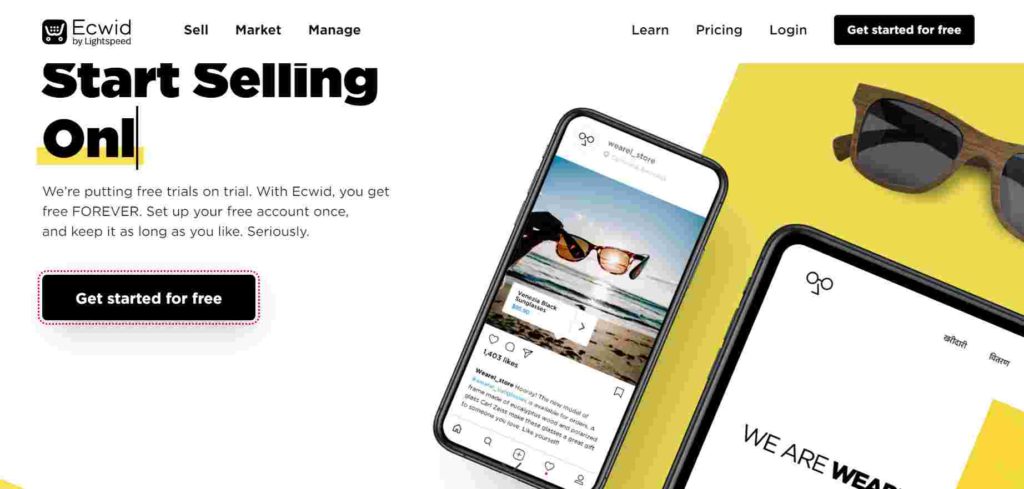
Ecwid is an ecommerce platform for small businesses and entrepreneurs. It consolidates data from all of your sales channels and provides a single view of your business.
Ecwid also offers a suite of tools to help you grow your business, including product recommendations, abandoned cart emails, and email marketing.
E-commerce merchants can use Ecwid to create and customize their online stores. Ecwid provides a wide range of features and tools to help merchants run their businesses, including marketing promotions and more personalized and customized store experiences.
By using Ecwid, merchants can save time and money while still providing their customers with a great shopping experience.
Pros of Ecwid
- Ecwid allows businesses to manage their inventory using advanced tools, making it easier to keep track of stock levels and ensure that items are always in stock.
- Ecwid also provides mobile app support, so businesses can manage their inventory on the go.
- Order tracking is another handy feature, allowing businesses to keep track of customer orders and ensure that they are fulfilled on time.
Cons of Ecwid
- One downside of Ecwid is that it is a paid service, so businesses will need to factor this into their budget.
- Another potential downside is that businesses will need to invest time in learning how to use the Ecwid platform, as it can be complex.
12. Miva

Miva is an ecommerce store platform that offers a smooth web interface for ecommerce merchants. It is a powerful platform that provides all the tools and features needed to create and manage an online store.
Miva is easy to use and provides a wide range of features, making it a great choice for ecommerce merchants.
Miva is a highly customizable ecommerce platform that allows merchants to tailor their store to their specific needs.
It also has powerful order management features that allow merchants to keep track of their customers’ orders and shipping status.
These features make Miva a very powerful and productive tool for ecommerce merchants.
Pros of Miva
- Miva consolidates data from multiple sources into one easy-to-use platform.
- Miva’s user-friendly navigation makes it easy to find and use the data you need.
- Miva’s campaign manager tool makes it easy to create and track marketing campaigns.
Cons of Miva
- Miva’s consolidation and backup features may be unnecessary for some users.
- iva’s user-friendly navigation may be too simple for some users.
13. Verifone

Verifone ecommerce store platform is an ecommerce solution for merchants that want to take advantage of many payment gateways. It is a reliable platform that is easy to use and offers a wide range of features.
The platform is also compatible with a wide range of devices, making it a great choice for merchants who want to take advantage of the latest technology.
Verifone is a very user-friendly navigation system that helps ecommerce merchants keep track of their sales and customers.
Additionally, Verifone offers excellent customer support features that allow merchants to resolve any issues they may have. Overall, Verifone is an extremely productive tool for ecommerce merchants.
Pros of Verifone
- Verifone provides an integrated point-of-sale (POS) and eCommerce payments solution that helps store fulfillments and ecommerce hosting businesses streamline their operations.
- The company’s products are used by major retailers and businesses around the world, making it a trusted and reliable provider.
- Verifone’s solutions are easy to use and offer a variety of features that can benefit businesses of all sizes.
Cons of Verifone
- Verifone’s products are not cheap, and the company does not offer any free trials or money-back guarantees.
- The company’s customer support is not always responsive, and some users have complained about difficulties getting in touch with a representative.
14. VTEX Commerce Platform
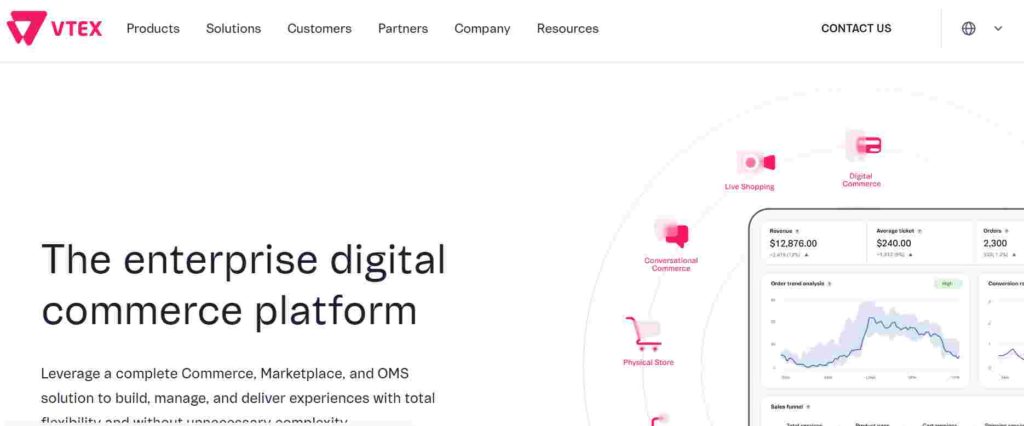
VTEX is a powerful ecommerce store platform that provides merchants with enhanced security features to keep their businesses safe. It also offers a wide range of features and tools to help businesses grow and succeed online.
VTEX is a great choice for businesses of all sizes, from small businesses to large enterprises.
The VTEX Commerce Platform is productive for ecommerce merchants because it offers a comprehensive campaign manager and marketing promotions features.
These features allow merchants to launch and manage marketing campaigns as well as create and track promotional offers.
The platform provides detailed reporting and analytics to help merchants measure the success of their campaigns and optimize their marketing efforts.
Pros of VTEX Commerce Platform
- VTEX provides a comprehensive commerce platform that helps businesses streamline their operations and grow their online presence.
- The platform offers an order tracking system, a store management system, and an inventory management system, among other features.
- VTEX also integrates with many payment gateway providers, making it a convenient solution for businesses that want to accept online payments.
Cons of VTEX Commerce Platform
- VTEX does not offer a free trial, so businesses will need to purchase a subscription in order to use the platform.
- The platform may be overwhelming for businesses that are new to online commerce, as it offers a lot of features and integrations.
15. Oracle Commerce
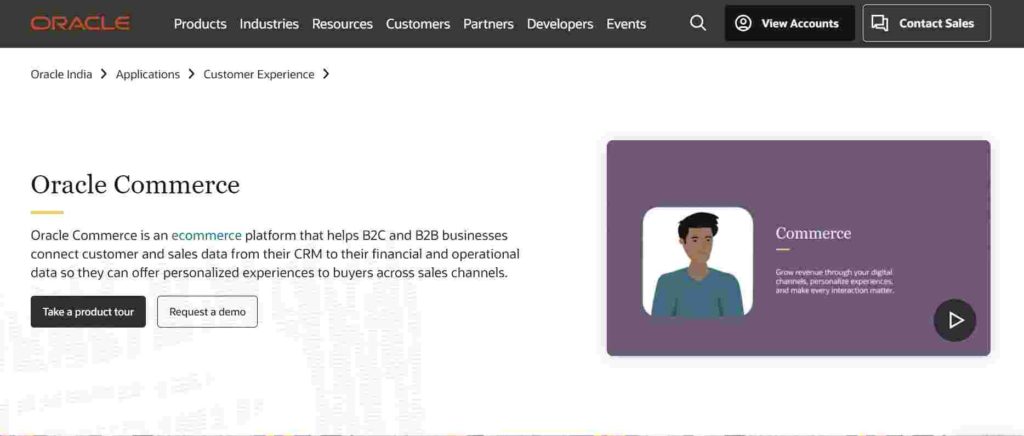
Oracle Commerce is a powerful, yet easy to use ecommerce store platform that helps merchants build beautiful, responsive online stores. With many theme design options available, merchants can easily create a unique look for their store that reflects their brand.
Oracle Commerce also offers a wide range of features and plugins to help merchants run their business, such as order management, product catalog, and customer management.
Oracle Commerce is a very powerful and productive ecommerce platform for merchants. It offers a complete set of Store Analytics and Store Management features that help merchants to run their online stores effectively and efficiently.
Oracle Commerce provides merchants with all the tools and functionality they need to manage their online stores effectively and efficiently.
Pros of Oracle Commerce
- Oracle Commerce provides order tracking capabilities that can be beneficial for businesses that need to keep track of their orders.
- Oracle Commerce offers many payment gateway options, which can be helpful for businesses that need to accept multiple payment methods.
- Oracle Commerce includes content management features that can be helpful for businesses that need to manage their website content.
- Oracle Commerce provides promotion opportunities that can be beneficial for businesses that want to promote their products or services.
Cons of Oracle Commerce
- Oracle Commerce can be expensive to implement and maintain.
- Oracle Commerce can be complex to use, which can make it difficult for businesses to get the most out of the platform.
- Oracle Commerce can be slow to load, which can impact the user experience.
16. HCL Commerce
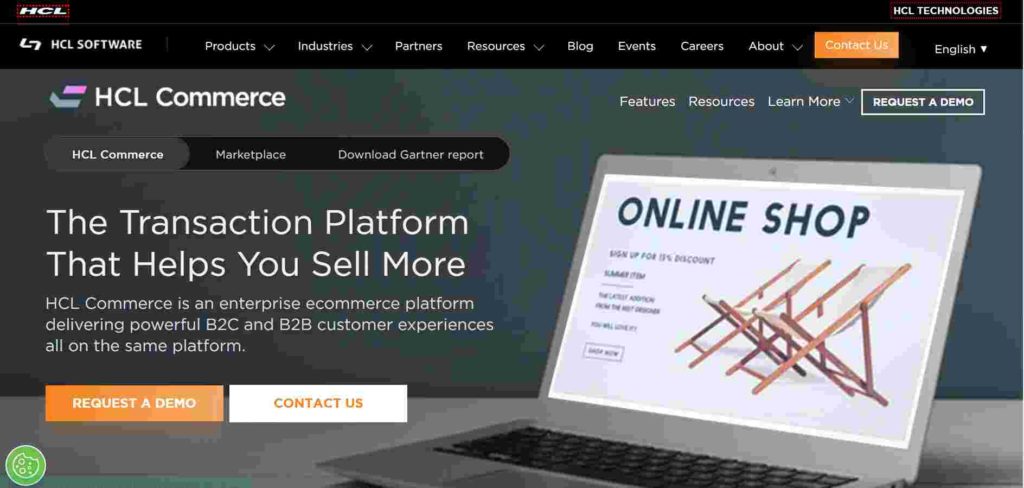
HCL Commerce ecommerce store platform is a great opportunity for ecommerce merchants to promote their products and services.
The platform provides a number of features that make it easy for merchants to sell their products and services online.
HCL Commerce provides ecommerce merchants with a productive web interface through features such as product reviews and a smooth web interface.
This allows merchants to manage their online store in a more efficient and effective manner, improving their overall productivity.
This tool also provides merchants with valuable customer insights through product reviews, which can help them improve their product offering and make more informed decisions about their business.
Pros of HCL Commerce
- Allows businesses to manage their catalogs and payments more securely and efficiently.
- Provides businesses with insights and analytics to help them optimize and improve their stores.
Cons of HCL Commerce
- May be more expensive than some alternatives.
- Some businesses may not need all the features offered.
17. Spryker Cloud Commerce

Spryker Cloud Commerce ecommerce store platform for ecommerce merchants with Mobile App is a cloud-based ecommerce platform that helps merchants manage their online stores and mobile apps.
The platform provides merchants with a simple, yet powerful, way to manage their ecommerce business.
With Spryker Cloud Commerce, merchants can easily create and manage their online stores, as well as their mobile apps.
Spryker is a productive ecommerce platform for merchants because it offers features like email notifications and payment gateways.
These features allow merchants to stay organized and keep track of their sales, customers, and orders.
Spryker also offers a wide range of other features that can help merchants run their businesses more efficiently, such as a search engine, product catalog, and customer management tools.
Pros of Spryker Cloud Commerce
- Spryker Cloud Commerce is a cost-effective way to keep track of your orders and coupons.
- The user interface is easy to use and navigate.
Cons of Spryker Cloud Commerce
- There is no free trial for Spryker Cloud Commerce.
- The monthly subscription fee may be too expensive for some users.
18. WordPress
WordPress is a popular ecommerce store platform for selling products and services. You can use WordPress to create a website or blog for your business, and to sell products and services online.
WordPress is easy to use and has a lot of features that you can use to customize your website or blog. You can also use WordPress to create a shopping cart for your website.
WordPress is a content management system (CMS) that enables users to create a website or blog. It is a popular choice for many ecommerce merchants because it is easy to use and has a wide range of features, including chat support and payment gateway integration.
These features make it easier for merchants to manage their website and sell their products or services online.
Pros of WordPress
- WordPress allows you to schedule your posts in advance, so you can publish them at a time that is convenient for you.
- WordPress provides security features that help protect your website from malware and hackers.
- WordPress can help you track your website’s traffic and performance.
- WordPress can help you keep track of your inventory and stock levels.
Cons of WordPress
- WordPress can be a costly platform to use, especially if you need to purchase premium plugins and themes.
- While WordPress is a very flexible platform, it does have its limits when it comes to customization.
- Despite the managed security features, WordPress websites are still susceptible to security breaches.
Why Do You Need Alternatives To Bigcommerce?
1. Bigcommerce is a huge platform and can be difficult to manage and scale.
2. It can be expensive to use for small businesses.
3. You may not be able to find the right products or services offered on Bigcommerce.
4. You may not be able to find the right deal or discounts on Bigcommerce.
5. You may not be able to find the right supplier on Bigcommerce.
One of the most popular ecommerce platforms is Bigcommerce. While it’s a great platform, there are a few alternatives that can provide you with the same level of functionality and features.
If you want to use a platform that’s more customizable, Shopify could be a good option. It offers more control over your website’s design and layout, plus you can add custom themes and plugins to make your site look and feel unique.
If you need more support than Bigcommerce can offer, then we recommend using an ecommerce platform like Magento. It has tons of features for businesses of all sizes, and its customer service is top-notch.
Finally, if you want to focus on selling physical products instead of digital ones, then Etsy might be a good option for you.
It has an extensive inventory of products from all different brands and categories, so finding what you’re looking for shouldn’t be too difficult.
So which alternatives to bigcommerce are right for you?
It really depends on your specific needs and preferences. If you want to explore some of the other great options available, be sure to check out our blog posts on the best ecommerce platforms and the best bigcommerce alternatives!
What Features To Look For in Bigcommerce Competitors?
When looking for alternatives of bigcommerce, there are many different alternatives available. Here are a few features to look for in these competitors.
1. Ease of use
It is important that the replacement platform is easy to use, especially if you are new to ecommerce. Look for platforms that have an intuitive design and easy navigation.
2. Flexibility
It is important that the replacement platform offers a wide range of features, both big and small. This allows you to customize your shop to fit your specific needs.
3. Price
It is important that the replacement platform offers competitive prices. You want to find a platform that can save you money on your shopping bills.
4. Features
Another important factor to consider is the features offered by the platform. Make sure that the replacement platform has all of the features that you need, including shipping options, payment gateways, and more.
What are Competitors of Bigcommerce For Creating an Online Store?
Swell
WooCommerce
Shopify
Ecwid
Oracle Commerce
FAQ
The bigcommerce alternatives include Shopify, Squarespace, Sellix, Swell, etc.
There are a variety of opinions on bigcommerce reviews for online stores. Some say they are helpful, while others caution against using them. Overall, bigcommerce reviews can be a useful tool for research, but it is important to remember that they are just one person’s opinion.
The bigcommerce product recommendations can be found in the “recommended products” section on the bigcommerce website.
The bigcommerce shopify alternatives are Swell, Ecwid, Sellix, and WooCommerce.
The bigcommerce product options for ecommerce business include physical goods, digital products, and services. BigCommerce provides a customizable platform for businesses to sell their products online, and offers features such as a built-in shopping cart, product reviews, discounts and coupons, and more.
The bigcommerce payment plans are
1. Credit Card
2. PayPal
3. Amazon Payments
4. Apple Pay
5. Google Pay
6. Stripe
The bigcommerce payment options for Small business stores include PayPal and Stripe.
BigCommerce is a platform for businesses of all sizes to create an online store. It offers a customizable platform with a wide range of features, including a point-of-sale system, shipping and tax calculations, discounts and coupons, and support for multiple languages and currencies. BigCommerce also offers a wide range of integrations with other business software, including accounting, CRM, and ERP systems.
The top Alternatives to Bigcommerce Platform are Swell, Drupal, WooCommerce, Shopify, and Magento.
The best place to find BigCommerce store examples is on the BigCommerce website itself. There is a tab on the website labeled “Showcase” which features a variety of different stores that use the BigCommerce platform. You can also find a number of different store examples by doing a simple Google search.
BigCommerce is an ecommerce platform that enables businesses to set up an online store. It is a legitimate platform that is used by many businesses.
The bigcommerce shipping options for Online Stores include UPS, FedEx, and DHL. Each bigcommerce store will have different shipping options available, so it is important to check with the specific store before making a purchase.
There are many companies that use bigcommerce for their online store. You can find the list on their website for a better look at their stores.
Some examples of online stores that use BigCommerce are Huggable Hangers, Tony Robbins, and Steve Madden.
No, Bigcommerce is not free. There are various pricing plans depending on the features and support you need for an online store.
The benefits of BigCommerce are many and varied, but some of the most notable ones include its ease of use, its scalability, and its robust feature set. Additionally, BigCommerce is highly customizable, which means that businesses can tailor it to their specific needs and requirements.
Some advantages of using BigCommerce include
1. No need to worry about hosting or managing server infrastructure.
2. Flexible, customizable platform that can be scaled as needed.
3. Integrated with a number of third-party applications and services.
4. Strong security and compliance features.
Some disadvantages of using BigCommerce include
1. Pricing can be expensive for certain features and add-ons.
2. The platform can be complex and intimidating for first-time users.
3. Third-party integrations can cause issues if not properly configured.
The Bigcommerce Variant Options are CoreCommerce, Ecwid, Verifone, and Squarespace.
The Bigcommerce Competitors for Ecommerce Stores are Shopify, Magento, WooCommerce, Sellix, and Swell.
The big commerce competitors in Online Business Stores include Oracle Commerce, HCL Commerce, VTEX Commerce Platform, and SAP Commerce Cloud.
The Competitors of Bigcommerce Platform are Miva, Drupal, Sellix, and Swell.

